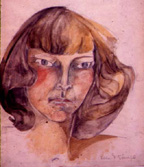|
Works of art reveal their many depths and facets as I journey on in years and experiences. A painting or a song or a poem I encounter now will have a significantly different meaning than if I had seen it ten or fifteen years ago. And sometimes a certain film or book won't peak my interest until I am ready for it. So I stumbled upon a biography called Zelda by Nancy Milford while I was traveling in Central America. A 2001 reissue in paperback, sitting on the bottom of a dusty bookshelf, surrounded by Mayan masks and wall hangings, in the corridor of a Spanish colonial designed hotel, in the heart of volcanic Antigua, Guatemala.
Zelda Fitzgerald was an infamous wild beauty from the Deep South. She was the wife of a famous writer, F. Scott Fitzgerald. She was a dancer, a writer and a painter. She was also a celebrity, the other half of a glamorous, golden couple that inhabited the essence of what F. Scott had named the Jazz Age. She had a bright, creative mind, damaged by alcohol and mental illness and spent the last two decades of her life in and out of hospitals and sanitariums before dying in a fire along with eight other women in a place called Highland Hospital. And Zelda struggled her whole life to find her artistic voice.
Zelda's paintings and drawings are accomplished and vibrant, at times raw and frightening.  Her writings and letters are not as structured and focused as F. Scott's works. He had the discipline and form of a great writer. But Zelda's detailed descriptions of places, her characters' desires for love and free living, and the insight about her own life and her passion for it were extraordinary for the time. Her husband used portions of her diaries and their lives as fodder for most of his material. F. Scott Fitzgerald died from the ravages of alcoholism, and even though he had a reputation of bad conduct and excessive living, he was able to create a body of work that gained him fame and fortune and a place among the great novelists of the 20th century. Zelda was plagued by her own personal demons, but her untamed spirit and reckless behavior was not looked upon with forgiving eyes. Her expected role as a wife and a mother, her need to express herself in art, and her emotional instability were too often at odds with each other. Her writings and letters are not as structured and focused as F. Scott's works. He had the discipline and form of a great writer. But Zelda's detailed descriptions of places, her characters' desires for love and free living, and the insight about her own life and her passion for it were extraordinary for the time. Her husband used portions of her diaries and their lives as fodder for most of his material. F. Scott Fitzgerald died from the ravages of alcoholism, and even though he had a reputation of bad conduct and excessive living, he was able to create a body of work that gained him fame and fortune and a place among the great novelists of the 20th century. Zelda was plagued by her own personal demons, but her untamed spirit and reckless behavior was not looked upon with forgiving eyes. Her expected role as a wife and a mother, her need to express herself in art, and her emotional instability were too often at odds with each other.
I understand Zelda and I've had a different life. I am a woman in my thirties, questioning motherhood and reinventing my future romance and fortune. I spent years as an actor only to feel dissatisfied with the process and needing to create my own words. Recently, I traveled alone for five weeks to breathe in different cultures, to write and to face the challenge of expressing myself in my own genuine voice.
There was inspiration. There were breathtaking views from mountain tops and Mayan ruins surrounded by thick green jungle. The sounds of howling monkeys and rainbow-painted birds brushed all my dreams. There were glittering lakes and black sand beaches. The smell of warm sweet peppers invaded my nostrils. I drank rum and tanned my skin. I laughed and shed tears and danced under a volcano. I met lovely people in sleepy villages and made new friends. I respected the customs and spoke Spanish with my slowly growing vocabulary. I had a marvelous time. And yet I was reminded of my role as an outsider. Not just as a foreign outsider, but as a female outsider. There was a reticence, a hesitation, a distrust towards me from both men and women, natives and ex-patriots. Why would an American woman be traveling through Central America, unescorted and for the sole purpose of personal exploration? Why was I there alone with no husband, no family or friends and no contacts? What was I writing about?
Zelda kept me company on a few lonely nights. Another woman's private thoughts exposed for me as a kind of mirror to hold up to my own. Her ideas symbolizing the rich complexity of an artist/woman in a conservative society and an American-dominated world. Her story came to me when I was ready to read it. And in the next two or five or ten years, another journey, under a new volcano, fresh thoughts and ideas and colors of an artist will be unveiled to me. I am filled with promise.
|